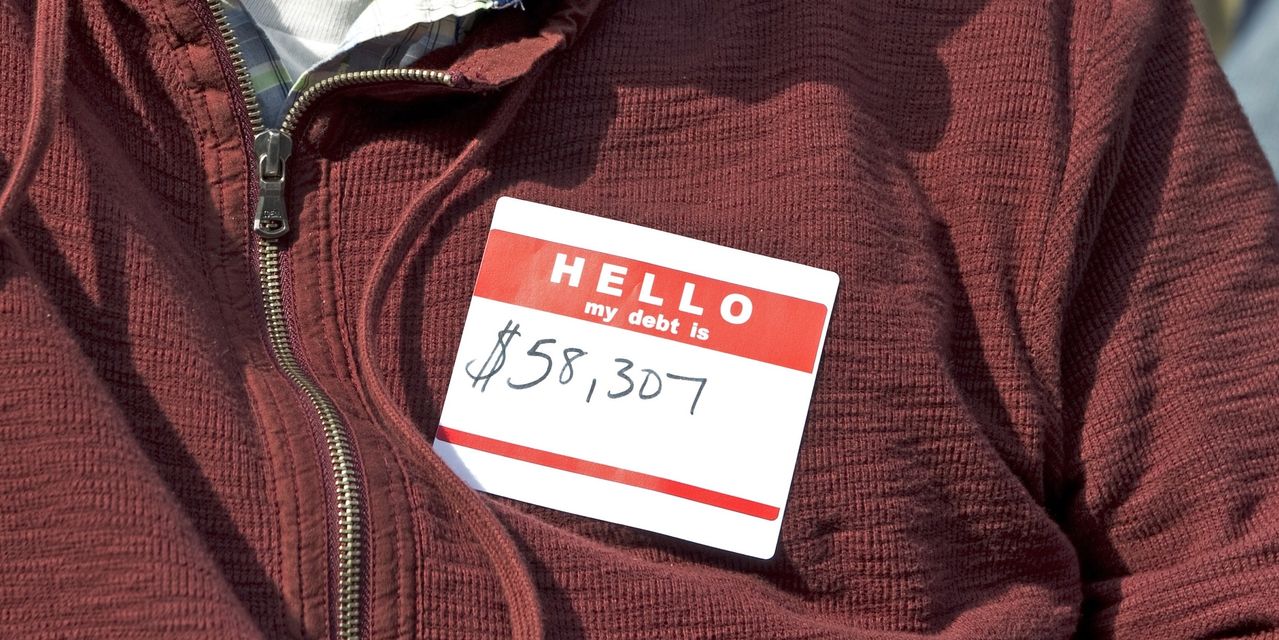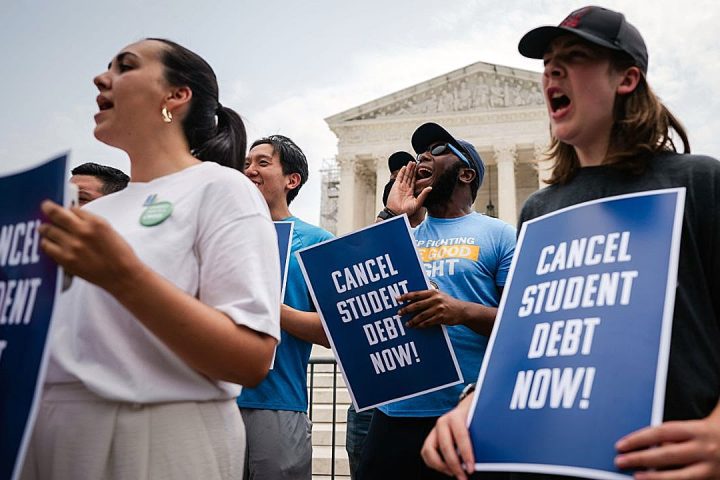Receiving bills saying they owed more than $10,000 per month; an average call wait time of 58 minutes; more than half of calls to servicers being dropped. These are some of the obstacles student-loan borrowers have encountered as they start paying student-loan bills for the first time in more than three years, according to the Department of Education.
The agency released the information as part of a memo arguing for remedies for affected borrowers, including that they shouldn’t be charged interest for periods during which account issues were being fixed. The document comes after weeks of complaints from borrowers about long call hold times, incorrect billing statements and more following the end of the pandemic-era student loan freeze this fall. Advocates have been urging the government to hold borrowers harmless for any errors during this period.
“We had been hearing about all of these problems all along, we’d raised them with the administration as well, these problems were not new to us, they were things that we were afraid might go wrong,” said Abby Shafroth, the director of the Student Loan Borrower Assistance Project at the National Consumer Law Center.
Shafroth said she was “really pleased” to see that the administration was doing some auditing of these issues. That’s because without monitoring data around borrowers’ challenges it’s difficult to understand the scope of the problem and ensure borrowers don’t suffer financially from the errors, she said.
Memo provides detail on challenges borrowers have faced
The Department announced earlier this week that it would be withholding payment from MOHELA after the student-loan servicer failed to send timely billing statements to about 2.5 million borrowers. These are some of the borrowers who will have interest waived, while their accounts are being sorted out.
In addition, the memo provides more detail on some of the ways borrowers have been impacted by the unprecedented challenge of returning 28 million accounts to repayment. Servicers, borrowers and the government itself anticipated some of these challenges due to the combination of changes to the student loan system and the sheer volume of borrowers interacting with it at once.
Congress declined to fulfill the Department of Education’s funding request for the Office of Federal Student Aid, which pays servicers. The organizations, which are borrowers’ main point of contact when repaying their loans, slashed staff and call center hours after the funding cuts.
In addition, the agency is in the midst of making major adjustments to the student loan system that will likely make repayment more manageable for many but can be challenging to implement. What’s more, for years, advocates and some regulators have said that student loan servicers don’t provide borrowers with enough or the right information to successfully manage their debt.
The Biden administration provided a so-called on-ramp to protect borrowers from the most dire consequences of falling behind on a student loan for a year after payments end. Still, it wasn’t enough to insulate them from facing financial consequences due to errors, according to the memo.
“These borrowers are returning to a student loan system that is midstream in making fundamental reforms to student loan servicing and borrower benefits, at a time when FSA is managing multiple management priorities with constrained funding,” the memo reads. “In sum, returning to repayment after the payment pause is one of the most significant management challenges in FSAs history.”
Servicer transfers source of the errors
About 78,000 borrowers received incorrect monthly bills as they transitioned to SAVE, a repayment program the Biden administration launched earlier this year. That’s in part because of issues related to servicer transfers, the memo said. Roughly 40% of borrowers have a different servicer than before the pandemic.
In the cases of more than 5 million borrowers whose accounts were transferred, their old servicer didn’t send over the information necessary to enroll borrowers in SAVE, according to the Department. Under SAVE, a borrower’s payment amount is based on their income and family size, so accurate data is important to ensure a borrower is billed correctly.
In some cases, the new servicer relied on data that the old servicer reported to the government to enroll borrowers in the repayment plan. That conflicted with accurate information about a borrower’s income and household and led to incorrect billing statements.
The memo cited an example of how this scenario played out. One borrower received a bill that said she owed $355 per month, even though before the pandemic she owed $130 per month. Under SAVE, her payment should have been $58 per month. But the bill she received was based on data her previous servicer reported to the government indicating that she had a family size of one. That’s even though in a different record the same servicer had reported to the government that she was married.
Other borrowers received incorrect bills for different reasons. The Department said that hundreds of borrowers received statements saying they owed more than $10,000 per month and a few borrowers got bills saying they owed more than $100,000 per month.
About 16,000 borrowers who applied to have their debt cancelled because they’ve been scammed by their schools or are waiting on their debt to be discharged because the Department found their school misled them were incorrectly taken out of forbearance while waiting for relief, according to the memo. In some cases, these borrowers made payments.
The agency also said borrowers struggled to get ahold of their servicers as they coped with these issues. The average call wait time was 58 minutes, according to the memo. And roughly 52% of calls were dropped during the week the document was written.
Borrowers faced a variety of consequences as a result of incorrect or missing billing statements, including losing out on progress towards forgiveness programs and being marked as delinquent.
Receiving incorrect bills can have consequences for borrowers’ ability to manage their debt, Shafroth said. Some may choose to disengage with the system and not make a payment if they’ve taken steps to access a manageable payment amount, but the amount they appear to owe is more than they can afford. Other borrowers might pay the incorrect amount, but scrimp on other bills or financial priorities so that they can afford to do it, she said.
Paying insufficient service funds fees over an incorrect or unexpected bill
In addition, due to the errors, some borrowers had funds auto-debited from their account to pay their student loans that exceeded their bank balance. The Department is requiring servicers to refund any insufficient funds fees borrowers were charged in these cases.
Finally, borrowers who were interested in enrolling in SAVE, but were unable to due to servicers’ logistical challenges to enroll lost out on an interest subsidy. Under SAVE, payments are tied to a borrower’s income, not their loan balance. If their payment is too low to cover the interest, the government will pay the remaining interest, so that a borrower’s balance won’t increase.
In part to remedy these issues, the government will ensure that affected borrowers’ loans don’t accrue interest while their accounts are in an administrative forbearance so these errors can be fixed. In addition, any time borrowers spend in administrative forbearance while their accounts are being reviewed will count as progress towards forgiveness programs.
Shafroth said that many of these remedies — like the interest treatment — should happen automatically, but borrowers should still monitor their accounts to make sure the remedy is being applied. For borrowers seeking refunds, either because they paid an incorrect bill or because they were charged an insufficient funds fee by their bank, Shafroth suggests they proactively reach out to their servicers.
“We’re relying on the same servicers that messed up to implement a lot of these relief measures,” Shafroth said. “I continue to advise borrowers to the extent possible to be proactive and check to make sure that they’re getting the relief that they’re entitled to.”
Department claims regulations give it the authority to provide remedies
In the memo, the Office of Federal Student Aid argued that the Higher Education Act and the Federal Claims Collections Standards regulations give the agency the authority to provide these remedies. Under these laws, the Secretary of Education can “compromise” a debt if there is a concern about the legality of collecting on it.
The agency believes that “that these servicing errors pose litigation risks,” the memo reads, and they “therefore meet the basis for compromise.”
In addition, the agency said that if borrowers’ issues aren’t remediated, servicers are at risk of drawing scrutiny from other regulators.
“These servicing errors potentially violate several federal and state consumer protection laws,” the memo reads. “Federal and state regulators who are currently conducting supervisory examinations of FSA’s loan servicers to monitor return to repayment have already indicated that if FSA does not fully remediate these borrowers, they will likely find violations of their consumer protection laws.”
Read the full article here







